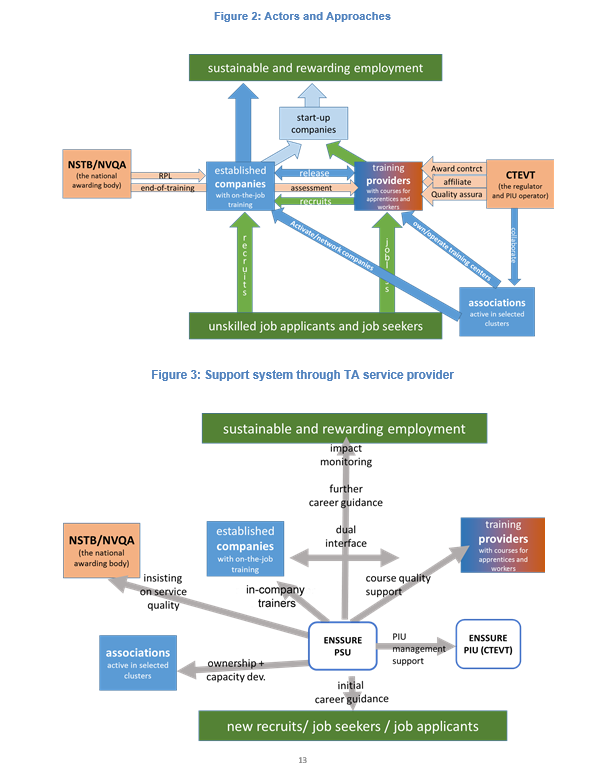Tue Jul 12 2022

ENSSURE will be implemented by CTEVT and a Technical Assistance (TA) service provider which will be selected in a competitive bidding process. The Project Implementation Unit (PIU) managed by CTEVT together with the Project Support Unit (PSU) managed by the TA provider will work with the following actors:
1. Partner companies: The partner companies will be supported to prepare human resource development plans in order to know what the skills requirements and thus the training needs are for their workforce. These companies will also accept apprentices and on-the-job trainees. The PSU will train in-company trainers who will supervise and guide the apprentices as well as the workers attending further training. In addition to the in-company trainers, this technical support to trainees in the companies will also be provided by experienced workers; those will be provided with coaching by the PSU. In return for this support which aims at higher labor productivity, the partner companies are expected to increase the trained workers’ salaries and the occupational health and safety (OHS). OHS trainings will be provided by CTEVT. The project will start its work with leading companies and will have to expand to so-called follower companies. This will be the tedious part of the project: Reaching them, establishing rapport and keeping them engaged; early productivity gains are to be shown to win them over and keep them interested.
2. Industry Associations: The industry associations will interact with the CTEVT PIU at all stages of the training of workers, i.e., inputs for training developments, evaluation of trainings etc. They have a crucial role as they need to guide their member companies, bundle their interests and mitigate inter-member rivalries. The project (PSU) will build necessary capacity for industry associations to fulfill this role.
3. Training providers: Public and private (including corporate) training providers will conduct off-the job systematic courses for workers in further training and apprentices as well as short courses for new job entrants. The on-the-job training component will be provided by the partner companies. The training providers also conduct management courses for company owners or interested workers at higher skills level (including migrant returnees) who want to start a company. Training providers must achieve a quality level which is above average and subscribes to “customer satisfaction”; this will entail strong methodology and even technological support by the project. The training courses are developed by the PIU with support of the PSU and inputs from industry associations. There will always be an issue of competition or rivalry between public and private training centers. Therefore, contract awarding must be fair and transparent and avoid bias.
4. NSTB/NVQA: ENSSURE will facilitate for the RPL of the workers who receive Workers’ further training with NVQA. It will be very important that NSTB (and in future NVQA) assures quality testing and credibility of their certificates in the labour market (to be supported by the new SDC-funded project).
5. Project Implementation Unit: The PIU located in the CTEVT acts as regulator, facilitates course design, and supports the training providers. The PIU awards contracts for training providers. The PIU operates sub-offices in the intervention areas.
6. Project Support Unit: The PSU trains and guides the in-company trainers; initially the PSU directly provides career guidance. The PSU provides technical support to the industry associations and the partner companies; the PSU also provides technical support to the PIU as required, including for the contract awarding system and for the monitoring of training course quality.